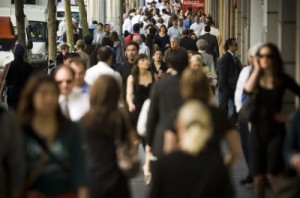Australia cohesive but fear of Muslims rising – survey finds

Copyright: Monash University
Australians’ mistrust of Muslims has risen recently but negative attitudes towards asylum seekers have fallen, according to a comprehensive national survey on social cohesion.
Of the 25 per cent of people who expressed negative views on Muslims, most were 65, tradespeople or Coalition voters.
Those most accepting of Muslims were likely to be younger – between 18 and 45 – degree holders or Greens Party voters.
But the Mapping Social Cohesion 2014 survey, produced by the Scanlon Foundation and the Australian Multicultural Foundation found Australia remained a highly cohesive society.
The survey, compiled by Monash University’s Professor Andrew Markus, found that Australians had a high level of identification with their country and almost all respondents expressed sense of belonging and pride.
About 85 per cent of people surveyed agreed with the statement “multiculturalism has been good for Australia”.
But an increasing number (10 per cent) said they were concerned about racism and twenty per cent said they had been the victims of discrimination.
Over the past year the issue of asylum seekers has declined as a concern for Australians with just 4 per cent citing it as a concern, compared with 10 per cent last year.
Similarly, Australians seem less concerned with immigration levels than they ever have been with 35 per cent saying it was too high, the lowest proportion in the seven year history of the surveys.
About 60 per cent said it was “about right” or too low”.
“There are only two countries in the world which are open to immigration – us and Canada,” Professor Markus said.
The survey also found trust in government had rebounded in the wake of terror attacks and conflicts in the Middle East.
But there were also signs of a fracturing society. Australians are less optimistic and more concerned about social justice and equity.
The Scanlon Monash Index (SMI), which measures social cohesion, has fallen ten index points since the first survey in 2007 although it appears to have stabilised in the past two years.
The SMI comprises five domains: sense of belonging; sense of worth; social justice and equity; participation; and, acceptance or rejection.
All of the measures have improved over the past year except for the social justice and equity domain, which fell 4.3 percentage points.
“This reflects views on the adequacy of financial support for people on low incomes; the gap between high and low incomes; Australia as a land of economic opportunity; and, trust in the Australian government,” Professor Markus told the survey’s launch event.
Australians’ identification with their country remained high with 92 per cent and 73 per cent of respondents said they were “satisfied” or “very satisfied” with their financial circumstances.
In ranking the problems facing Australia, the survey found the most significant change in attitudes to asylum seekers. The issue was cited by 12 per cent of people in 2013 but only 4 per cent in 2014.
“This suggests the majority of people are satisfied with the way the federal government has handled the issue,” Professor Markus said.
He said that in the context of rising unemployment and other economic concerns, there was an expectation that concerns over immigration levels would rise – yet the reverse occurred.
Just 35 per cent considered the intake too high while almost 60 per cent said it was about right or two low.
The survey found the majority of Australians have significant trust in police and the legal system with 83 per cent holding a positive view of the police and 71 per cent viewing the courts and legal system positively.
These figures contrast with attitudes toward Australia’s system of government and show significant dissatisfaction with the workings of the political system and low levels of respect for politicians, parties and parliament.
In 2014, just 15 per cent of respondents agreed that the system of government “works fine as it is”; 48 per cent said it needed minor change; and, 11 per cent said it should be replaced.
A marked increase in the reported experience of discrimination was also a finding of the survey.
The number of people saying they experienced discrimination because of their skin colour, ethnic origin or religion rose from 12 per cent in 2012 to 19 per cent this year.
Of those reporting discrimination, 14 per cent said it occurred about once a month while 15 per cent said it occurred most weeks of the year.
Discrimination was reported by 16 per cent of those born in Australia, 11 per cent of overseas-born of English-speaking background and 26 per cent of non-English speaking background.
In a similar vein, five times more people (25 per cent) said they had negative attitude toward Muslims as compared to negative attitudes towards Christians or Buddhists (5 per cent).
The survey showed continued high levels of general support for multiculturalism with 84 per cent saying it has been “good for Australia”.
But opinion is divided when issues of integration are raised, the survey found.
Thirty-eight per cent of third generation Australians believed it was best for the nation if people forget their ethnic of cultural backgrounds as soon as possible and 36 per cent disagreed with this.
But Victorians had the most positive view of multiculturalism with 43 per cent strongly agreeing it had been good for Australia.
“Victoria is the luckiest state in the lucky country because of our strong multiculturalism,” said President of the Legislative Council Bruce Atkinson in launching the report.
Laurie Nowell
AMES Senior Journalist












